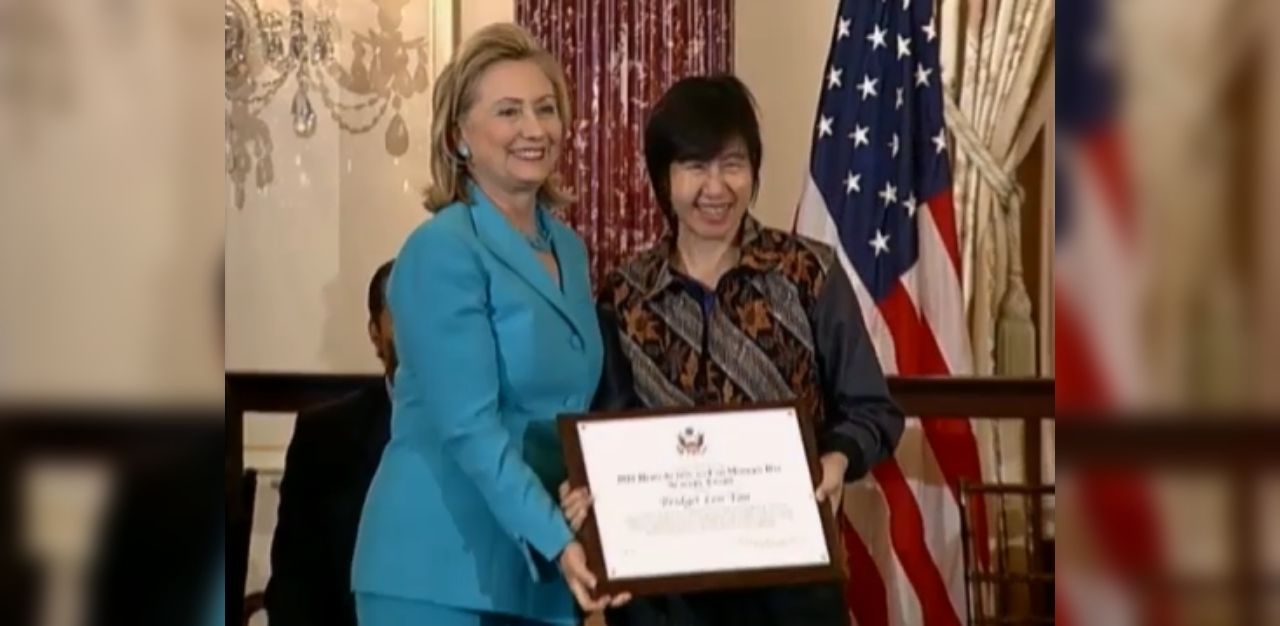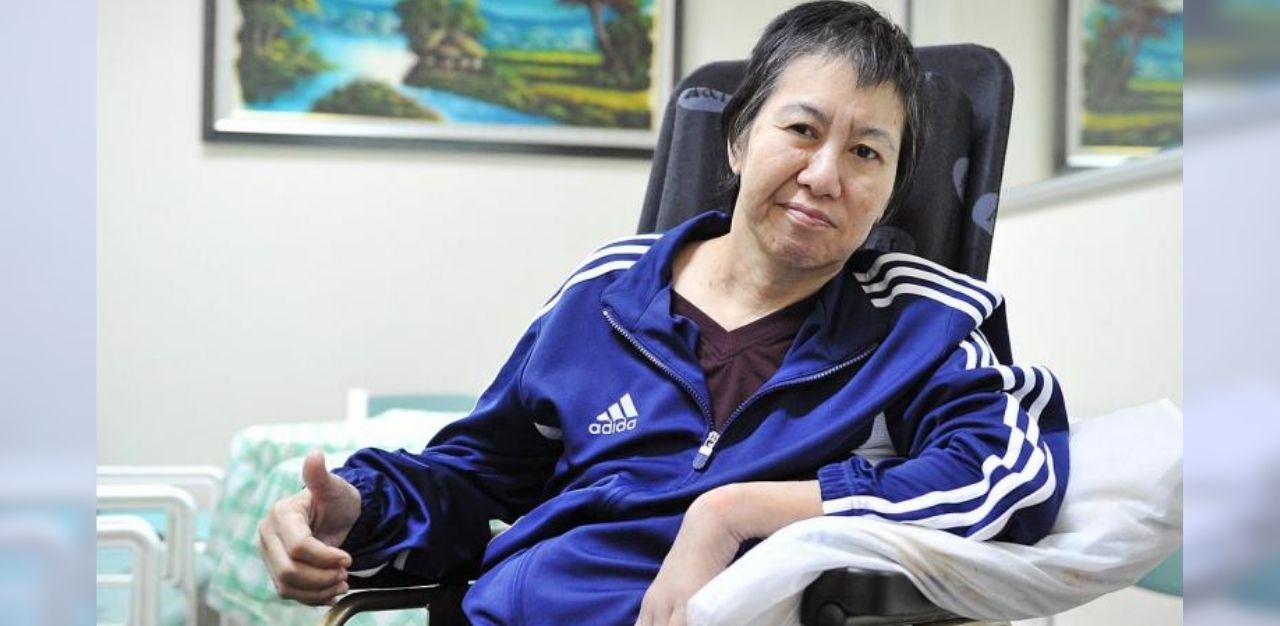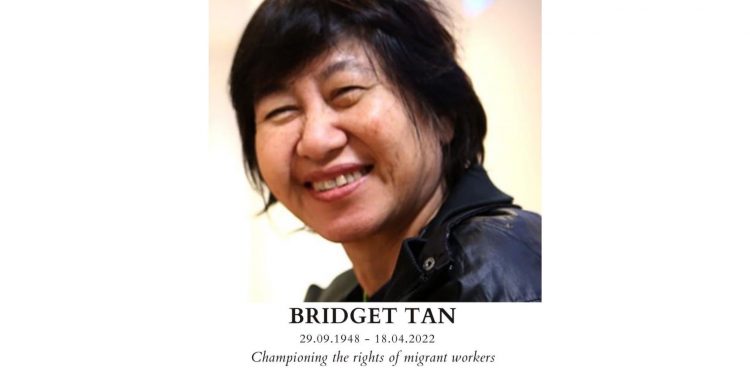Migrant worker’s rights advocate and the founder of the Humanitarian Organization for Migration Economics (HOME) Bridget Tan died today – seven years after suffering a stroke.
She was 73.
Mrs Tan had been spending the last few years in Batam, where she recuperated while working with non-profit groups there.
Born in 1948, she was the third of four children to a doctor and a housewife. Her father died when he was 36. Mrs Tan was then just five. In an interview, she described her father as her role model. He gave free medicine to those who could not afford to pay for treatment and was active in the independence movement during the British colonial days.
Mrs Tan attended CHIJ Katong Convent and later worked in human resources in the private sector until she retired at 55.
An advocate for the downtrodden

In 1998, Mrs Tan helped found the Roman Catholic Archdiocesan Commission for the Pastoral Care of Migrants and Itinerant People (ACMI). She joined the initiative at the request of Catholic priest Father Andy Altamirano. Father Altamirano died shortly after the commission was founded and she became its chair, a volunteer position.
In a 2011 interview, she said that she “felt the call of God” when Father Altamirano asked her to be involved in the commission. Mrs Tan set up food, shelter, and training programs for ACMI but later left because of the Church’s refusal to support its programs.
In 2004, Mrs Tan founded HOME using her retirement funds. The organisation provides temporary room and board, medical, legal, and financial assistance, and job skills training to migrant workers who have been abused or exploited by their employers or agents. Since its founding, the organisation has expanded its focus, and now also works to support victims of the sex trade and to combat human trafficking. It also engages in advocacy efforts.
In its tribute to Mrs Tan on its Facebook page, HOME says she was “an untiring advocate and champion of the rights of migrant workers”.
“She played a key role in establishing HOME’s current activities, which includes our shelter for abused domestic workers, skills training programmes, and our legal and employment advice services for all migrant workers. A pioneer in the field, such services were almost non-existent when HOME was formally established in 2004,” the post says.
“She played an active role in contributing to public discussion on the welfare and rights of migrants to change mindsets and policies. She was also active on international and regional advocacy platforms. Bridget was a true friend and ally of the migrants; she always provided a listening ear and extended a helping hand to many in need,” it adds.
Mrs Tan worked for HOME without pay until 2012, when the paid Chief Executive Officer was created, and she assumed the role.
In 2004, Mrs Tan also founded Yayasan Dunia Viva Wanita (bahasa for World Foundation For Women), a women’s shelter in Sekupang, Batam, Indonesia. The organisation is listed on HOME’s website as its “cross border partner” and they collaborated in 2012 on a survey of sex workers in Batam.
For her advocacy work, Mrs Tan received several international awards. Even the governments of Thailand and The Philippines have also honoured her for her work.
In 2010, she traveled to Jakarta, to represent HOME, which had been selected by the Asia Society for the 2010 Asia Society-Bank of America Merrill Lynch Asia 21 Young Leaders Public Service Award. In the same year, she Tan was nominated for the Reader’s Digest Asian of the Year award, and received an honourable mention.
She was given a Hero Acting to End Modern-Day Slavery Award by then United States Secretary of State Hillary Clinton in 2011 and was even mentioned in Mrs Clinton’s speech.
In Singapore, she was lauded for her advocacy and welfare work for migrant workers and was inducted into the Singapore Women’s Hall of Fame in 2015.
Collapsed and hospitalised because of stroke
It was in February 2014 that Mrs Tan, who was diabetic and had high blood pressure, suffered a stroke. It was reported by mainstream media that she collapsed in her home and was brought to Changi General Hospital, where she had emergency surgery and spent two months in intensive care.

Mrs Tan relocated to Batam to recuperate from her stroke and told The Straits Times that the slower pace of life and relaxed environment there will help in her recovery. She stayed at the Yayasan Dunia Viva Wanita house and continued to remotely direct the charitable organisations she is involved in, and travels to Singapore monthly.
Her first public appearance after the stroke was in December the same year, when she attended a ceremony commemorating the ten year anniversary of HOME. Mrs Tan said then that her greatest achievement of the past decade was raising Home from its local status to “international recognition at regional and Asean levels”.
“The work is unending, as long as Singapore needs migrant workers, there will be a need for HOME,” she added.
In his tribute to Mrs Tan on his Facebook page, activist Jolovan Wham writes that he has always had a love-hate relationship with her, “as it sometimes is with people whom you admire and respect”.
“I learnt what it was like to ‘walk the talk’ through her, and when you are determined to do anything, however limited your resources, if you dream big, wonders can be achieved. She was a fierce advocate, and never minced her words. She was stubborn, and could be maddeningly frustrating to work with but also incredibly generous, kind, compassionate with a deep commitment to social justice. It will take me a while to process this,” he writes.
“A lot of who I am today is because of her: whether it was because she shaped my values and outlook in ways that nobody did when I first knew her in my early 20s, or because I rebelled against her later on. One of the giants in civil society and the migrant worker space is gone. She will definitely be missed.”
In his tribute, Speaker of the House Tan Chuan Jin writes, “I got to know Bridget when I was in the Singapore Ministry of Manpower when we were working on migrant workers matters. We met quite often at discussions, focus groups, consultations and I also visited her at her place where she outreached to street walkers.”
“She cared passionately for our migrant workers and championed their concerns and actively looked out for their well-being. She was a tireless campaigner for them and I am grateful for her work, her love and dedication.”
Mrs Tan leaves behind a son, a daughter and six grandchildren.
Join the conversations on TheHomeGround Asia’s Facebook and Instagram, and get the latest updates via Telegram.














